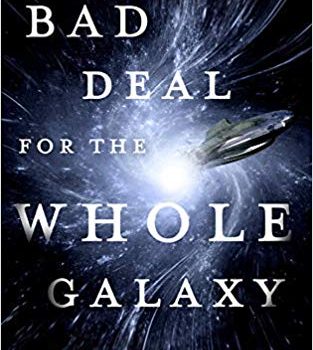Liz Bourke Reviews A Bad Deal for the Whole Galaxy by Alex White
 A Bad Deal for the Whole Galaxy, Alex White (Orbit 978-0-316-41210-0, $15.99, 532pp, tp) December 2018. Cover by Lisa Marie Pompilio.
A Bad Deal for the Whole Galaxy, Alex White (Orbit 978-0-316-41210-0, $15.99, 532pp, tp) December 2018. Cover by Lisa Marie Pompilio.
Alex White kicked off a rip-roaring (if you’ll pardon a hoary expression) space opera series in A Big Ship at the Edge of the Universe in summer 2018. In December, they followed up with A Bad Deal for the Whole Galaxy, a new instalment in this inventively bizarre high-stakes science fantasy space opera – and a sequel that more than lives up to the first volume. In the course of reading A Bad Deal for the Whole Galaxy, I found myself reminded ever so subtly of Star Wars and Farscape, and Sharon Lee and Steve Miller’s Liaden books – but Star Wars on acid, Liaden without the comedy-of-manners: this is a hectic, scrappy, weird-shit universe that White’s created, and in which they’ve set some hectic, scrappy, weird-shit novels.
In A Big Ship at the Edge of the Universe, the ragtag crew of the Capricious took on people who’d used magic to drain the life from whole planets in order to give themselves godlike powers. The Capricious’s crew of talented screw-ups and unusual misfits encountered several of the people they chose to refer to as the “Gods of the Harrow” and beat them – not without cost, but they won. Former racing-driver Nilah Brio chose to stay with her lover Orna aboard the Capricious, while magic-less pilot and artefact-hunter Elizabeth “Boots” Elsworth, alone of the Capricious‘s crew, chose to take her payout and retire to open a distillery.
Her retirement doesn’t last. When the Capricious under Captain Cordell – its crew now augmented by an unusual pair of siblings, both of whom have magic talents that make them able to lift true answers from people’s minds – arrives on her doorstep asking for her to join up again, her reluctance is easily overcome. The Capricious has been hunting for evidence of the intrigues of the Gods of the Harrow, and they’ve found some in the form of a nasty little cult known as the Children of the Singularity. But going after the Children of the Singularity – hunting the money that has to be funding the Gods of the Harrow – has its downsides. For one thing, a significant proportion of the news-consuming population is convinced that the threat the Capricious allegedly saved everyone from is fake news, and with the exception of Nilah, none of the crew of the Capricious are used to navigating – and using – the caprices of public opinion. Before too long, the Capricious and her crew are lone-operator outlaws again, hunting for a way inside the Children of the Singularity, and for the location of a man who betrayed Boots and killed one of her friends a long time ago: a man now capable of binding people irrevocably to immense, complicated contracts with his magic and their legal agreement. Vengeance and violence make uneasy bedfellows with heroism, but if Boots has a chance to shoot the man who stabbed her in the back… she’s going to take it.
Like A Big Ship at the Edge of the Universe, A Bad Deal for the Whole Galaxy is predominantly told from the points of view of Boots and Nilah. While Boots’s character arc in this volume is more concerned with her past and with her insecurity aboard the Capricious (and her curiosity about the two new additions to the crew), Nilah’s character arc is partly concerned with her relationship with surly, prickly Orna (whose violent and traumatic childhood returns to haunt her in very physical form in A Bad Deal for the Whole Galaxy), and partly with Nilah’s struggles and uncomfortable personal realisations as she infiltrates the brutal, murderous training camp of the Children of the Singularity – a training school for murderers and sociopaths at which Nilah discovers she’s rather good at surviving.
The main conflict in Nilah and Orna’s relationship is Orna’s fear of abandonment and Nilah’s at-times almost willful blindness about the ways in which her background and reactions to Orna make Orna feel less secure, rather than more. While I find their relationship interesting, I’m never entirely convinced by how simply some of their arguments are resolved – but this is a minor point in a novel that’s three parts thriller to two parts caper, with at least another couple of parts of pure worldbuilding shenanigans thrown in for good measure. And banter. Let’s not forget the banter.
Fast, compelling, epic in scope, with stakes that just keep getting higher and tension that mounts and mounts to the breaking-point, A Bad Deal for the Whole Galaxy is excellently paced, with engaging characters and worldbuilding that crams as much fun cool shit in as seems remotely possibly. It’s a deeply enjoyable ride. I recommend it and its predecessor heartily, and I’m agog to see how White can top this in the forthcoming The Worst of All Possible Worlds.
Liz Bourke is a cranky queer person who reads books. She holds a Ph.D in Classics from Trinity College, Dublin. Her first book, Sleeping With Monsters, a collection of reviews and criticism, is out now from Aqueduct Press. Find her at her blog, her Patreon, or Twitter. She supports the work of the Irish Refugee Council and the Abortion Rights Campaign.
This review and more like it in the February 2019 issue of Locus.
 While you are here, please take a moment to support Locus with a one-time or recurring donation. We rely on reader donations to keep the magazine and site going, and would like to keep the site paywall free, but WE NEED YOUR FINANCIAL SUPPORT to continue quality coverage of the science fiction and fantasy field.
While you are here, please take a moment to support Locus with a one-time or recurring donation. We rely on reader donations to keep the magazine and site going, and would like to keep the site paywall free, but WE NEED YOUR FINANCIAL SUPPORT to continue quality coverage of the science fiction and fantasy field.








